Analyzers
-
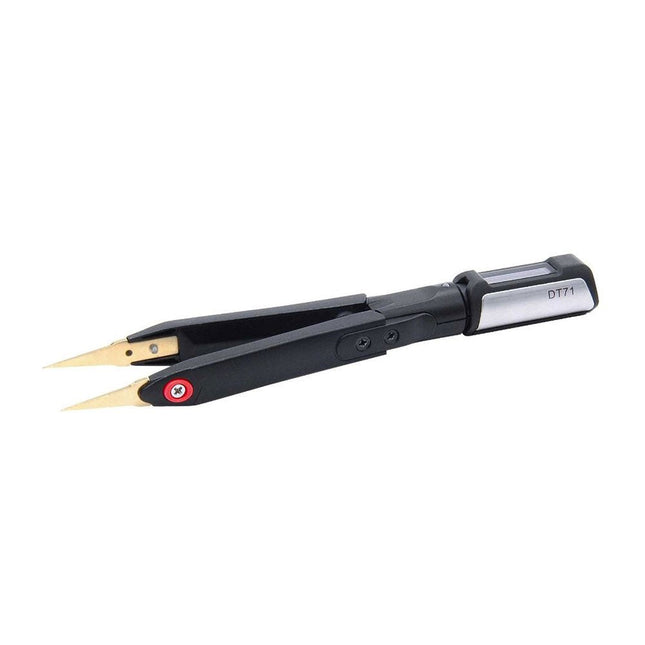
Miniware Miniware DT71 Mini Digitale Pincet
LCR/ESR Meter, Multimeter, SMD Tester met ingebouwde Micro SignaalgeneratorDe digitale pincet ‘Miniware DT71‘ is een ingenieus SMD-gereedschap met een innovatief pincetontwerp voor multifunctionele metingen met volledige differentiële ingangsmeting. De compacte DT71 heeft een unieke trinaire structuur die bestaat uit de controller, de testarmen en de pincetpunten. Deze kunnen flexibel worden verwisseld en gecombineerd. DT71 detecteert automatisch SMD's zoals weerstanden, condensatoren en diodes.Bijzonderheden De DT71 Mini Digitale Pincet is een instrument voor multifunctionele metingen met volledige differentiële ingangsmeting. De DT71 heeft een unieke drievoudige structuur, die kan worden onderverdeeld in een controller, de meetarmen, en de tweezer tips, deze zijn makkelijk te vervangen of te combineren. Hij is compact en heeft een zakformaat om gemakkelijk mee te nemen. Je kunt hem gebruiken in laboratoria, werkplaats, magazijnen en in het veld. Hij heeft ook dubbele ingebouwde oplaadbare lithium batterijen die 10 uur aan een stuk meegaan en een volledige oplaadbeurt duurt ongeveer 2 uur. De DT71 Mini Digitale Pincet heeft een OLED scherm op de 360° draaibare controller, zodat je hem onder alle hoeken kunt aflezen. Slimme gebarenherkenning herkent automatisch een links/rechtshandige bediening en past de schermweergave daarop aan. Hij kan verschillende soorten metingen uitvoeren om aan al je behoeften te voldoen. De meetarmen van de DT71 Mini Digitale Pincet gebruiken een magnetische bevestiging voor het eenvoudig vastklikken, voor een ergonomische en duurzame constructie. De DT71 Mini Digitale Pincet heeft een paar mooie vergulde verwisselbare tweezer tips, die een hogere meetnauwkeurigheid mogelijk maken. De DT71 Mini Digitale Pincet heeft handmatige en automatische identificatie modes. In de automatische stand kan de DT71 automatisch SMD onderdelen herkennen, waaronder weerstanden, condensatoren, spoelen en diodes, met weergave van zowel hoofd- als nevenparameters, erg handig om snel verschillende componenten te kunnen onderscheiden. Intussen kan een ingebouwde mini signaalgenerator een verscheidenheid aan golfvormen genereren. De DT71 biedt een perfecte oplossing voor het debuggen en onderhouden van complexe elektronische systemen en voor het classificeren en opsporen van discrete chip-componenten. Anders dan andere LCR testers heeft de DT71 Mini Digitale Pincet geen fysieke knoppen, in plaats daarvan heeft hij een verborgen aanraaktoets op de bovenkant van de regelaar, waardoor hij gemakkelijk te bedienen is met slechts een lichte aanraking. De DT71 Mini Digitale Pincet heeft intelligente functies zoals Automatische herkenning, Automatische uitschakeling, en ook de firmware kan worden opgewaardeerd. Kenmerken Innovatieve drievoudige structuur: onderverdeeld in een controller, meetarmen, en tweezer tips, die flexibel te vervangen en te combineren zijn. 360° draaibare controller met OLED scherm, met goede kijkhoeken Slimme gebarenherkenning met automatische herkenning van links/rechtshandige bediening en dienovereenkomstige aanpassing van de schermoriëntatie Verborgen aanraaktoets bovenop de controller, waardoor hij gemakkelijk te bedienen is met slechts een lichte aanraking Meetarmen maken gebruik van magnetische bevestiging voor het eenvoudig vastklikken, en hebben een ergonomische en duurzame structuur Ingebouwde dubbele lithium batterijen in de meetarmen, die beide armen in balans houden en een langere stand-by tijd geven Verschillende soorten vergulde verwisselbare pincetpunten, die bij diverse toepassingen een grotere meetnauwkeurigheid mogelijk maken Identificeert automatisch SMD's, waaronder weerstanden, condensatoren, spoelen en diodes, en toont zowel hoofd- als nevenparameters Een ingebouwde signaalgenerator kan een verscheidenheid aan golfvormen genererens Specificaties Product specificaties Gebruikstijd 10 uur (bij continu gebruik) Oplaadtijd 2 uur Display 96 x 16 OLED Afmetingen Controller 47 mm Meetarmen 106 mm Gewicht 22 g Werking Verborgen tiptoets Meet specificaties Bereik Resolutie Nauwkeurigheid Weerstand 0,1 ?~1 K? 0,1 ? 0,5%+2 1 K?~2000 K? 1 K? 0,5%+2 Capaciteit 0,1 pF~1000 pF 0,1 pF 2%+3 0,001 uF~400 uF 0,001 uF 2%+3 Inductiviteit 1 uH~1000 uH 1 uH 5%+3 1 mH~50 mH 1 mH 5%+3 Spanning 1 mV~100 mV 1 mV 2%+5 0,1 V~40 V 0,1 V 1%+3 Frequentie 10 Hz~1 KHz 10 Hz 0,1%+3 1 KHz~20000 KHz 1 KHz 0,1%+3 Diode Silicon diodes, Schottky diodes, LEDs (+0,1~3 V) 0,1 V 1% Max ingangsspanning -5 V~+50 V Bronimpedantie 1 M? Functies Automatische identificatie Ja Speciale metingen Ja Continuïteit en Diode tests Ja Signaal generator SINUS 10 KHz, 5 KHz, 2 KHz, 1 Khz, 500 Hz, 200 Hz RUIS 100 KHz GEBRUIKER 10 KHz, 5 KHz, 2 KHz, 1 Khz, 500 Hz, 200 Hz PULS 100 KHz, 0 KHz, 20 Khz, 10 KHz, 5 KHz, 2 KHz, 1 Khz, 500 Hz, 200 Hz Inbegrepen 1x DT71 digitale Pincet 1x Meetarmen 2x Tweezer Tips 1x Datakabel 1x Draagtas 1x Veiligheidsinstructies Downloads User Manual v1.3 Firmware v1.15 Calibration v2.0
-
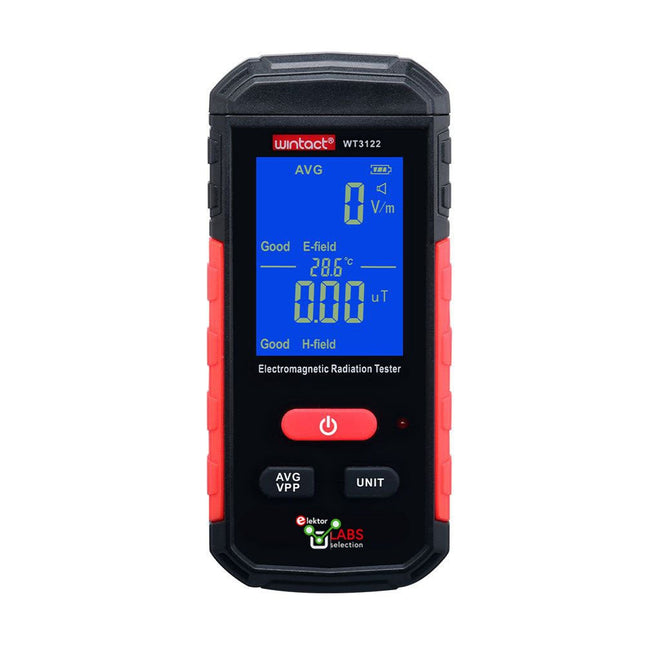
wintact Elektromagnetische Stralingstester WT3122
Deze stralingstester kan elektrische en magnetische velden meten om daarmee optimale testresultaten te verkrijgen. Hij kan worden gebruikt om elektromagnetische stralingssituaties binnen en buiten te testen en te analyseren. Hij is uitgerust met een ingebouwde elektromagnetische stralingssensor die, na verwerking door een microprocessor, de stralingswaarde kan weergeven op het digitale LCD-scherm. U kunt op basis van het testresultaat berekeningen uitvoeren of effectieve preventiemaatregelen nemen. Kenmerken Eén detector voor twee toepassingen, gelijktijdige detectie van de straling van elektrische en magnetische velden Weergave op een kleurenscherm Geluids- en lichtalarm, automatisch een alarm bij overschrijding van een veilige waarde Met één druk op de knop kan de stralingswaarde worden vastgehouden (data lock) Grafische weergave op de LCD van de trend in de stralingswaarde Beoordeling van de straling, waarbij aangegeven wordt of de huidige stralingswaarde veilig is Eenvoudig met één hand te bedienen, te verplaatsen, of mee te nemen om ter plaatse te meten Bronnen van elektromagnetische vervuiling identificeren (e-smog, smog, elektrosmog) Toepassingen Monitoring van elektromagnetische straling: huis en appartement, kantoor, buiten, en op een industrieterrein Testen van elektromagnetische straling: mobiele telefoon, computer, tv, koelkast en hoogspanningskabels Testen van stralingsbescherming bij producten: het effect meten van stralingsbestendige kleding, stralingsbestendige folie en andere preventieproducten Specificaties Elektrisch veld Magnetisch veld Eenheid V/m uT / mG Nauwkeurigheid 1 V/m 0,01 uT / 0,1 mG Bereik 1 ~ 1999 V/m 0,01 ~ 99,99 uT / 0,1 ~ 999,9 mG Alarm grenswaarde 40 V/m 0,4 uT / 4 mG Display 3½ digit LCD Bandbreedte metingen 5 Hz ~ 3500 MHz Sample tijd Circa 0,4 s Meetmodus Dual mode, gelijktijdig Indicatie overbelasting Maximale waarde van het meetbereik op de LCD Bedrijfstemperatuur 0 ~ 50°C Vochtbestendigheid Relatieve vochtigheid < 80 % Bedrijfsspanning 3,7 V Voeding 3,7 V Lithium accu Afmetingen 61 x 25 x 134 mm Gewicht 131 g Downloads Handleiding
-
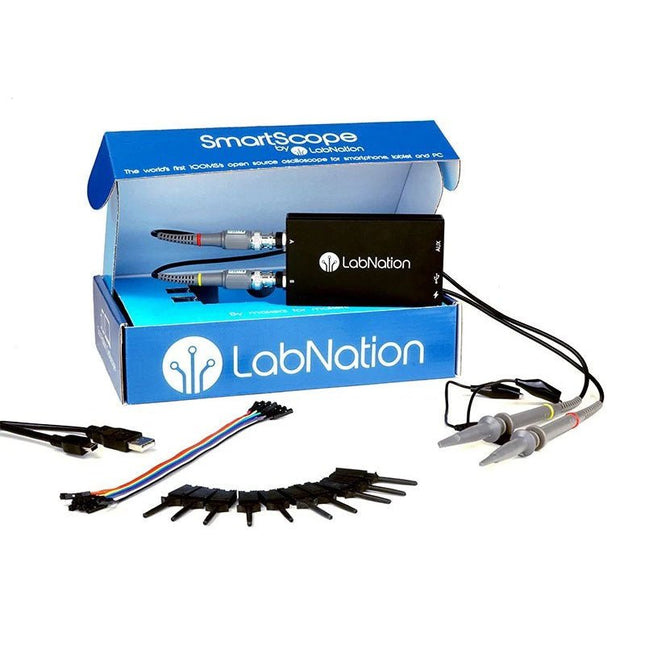
LabNation LabNation SmartScope USB-oscilloscoop
SmartScope is een compacte 2-kanaals USB-oscilloscoop met een bandbreedte van 30 MHz en een sampling rate van 2x 100 MSa/s. Het is compatibel met alle belangrijke platforms, waaronder Windows, macOS, Linux en Android. De bediening en weergave van meetsignalen gebeurt via smartphone, tablet of pc. Daarnaast zijn een logic analyzer en een signaalgenerator geïntegreerd. Met de SmartScope ontwikkelt u uw digitale interfaces met behulp van de 100 MS/s logic analyzer. Met dit gereedschap kunt u elk gewenst signaal ontwerpen met behulp van Excel, en het vervolgens uploaden naar de ingebouwde Arbitrary Waveform Generator (AWG). Aan het eind legt u 100 miljoen keer per seconde de spanning vast op elk punt van uw ontwerp. De software voor de ondersteuning van Windows / macOS / Linux / Android en exportformaten (Excel .csv / Matlab .mat) worden gegeven. Kenmerken Elk kanaal bemonsterd op 100 MHz/s AC/DC-koppeling op analoge ingangen 100% geruisloos 64 Mbit RAM: x10000 zoom Arbitraire golfvormgenerator 8 digitale ingangen bij 100 MS/s elk 4 digitale uitgangen van elk 100 MS/s Externe voeding voor het geval uw mobiel geen stroom kan leveren. Specificaties Oscilloscope Bandwidth 30 MHz (-3 dB point) Sample rate 2 x 100 MS/s Channels 2 Max pre-trigger position 16 x full scale Max post-trigger position Full scale Max full voltage scale 10 V/div (±35 V input range) Min full voltage scale 20 mV/div Analog input range -35 V, +35 V Max input peak-to-peak 40 V Signal coupling AC / DC Precision 8 bit Input impedance 1 MΩ // 10 pF Waverforms 200 waveforms/s Data delay to host < 10 ms Sample depth Up to 4 million samples per channel External trigger Yes Logic Analyzer Input channels 8 Input impedance 100 kOhm // 2 pF to GND Sample rate 100 MS/s Logic level 1.8 V to 5.0 V Diode protection Bidirectional Input data buffer 4 million samples Waverforms 200 waveforms/s Data delay to host < 10 ms Protocol decoders I²C, SPI, UART, I²S integrated User extensible Wave Generator (Analog Output) Output channels 1 Data rate Up to 50 MS/s Output level 0-3.3 V (Opamp driven) Output buffer Up to 2048 samples Max slew rate 30 ns/V Step 13 mV Wave Generator (Digital Output) Channels 4 Data rate Up to 100 MS/s Output level 3.3 V or 5 V (selectable) Output buffer Up to 2048 samples Diode protected Yes Programmable Logic USB controller MicroChip PIC18F14K50 USB interface PicKit3 or USB flashable FPGA Xilinx Spartan 6 FPGA interface JTAG and USB flashable Size & Weight Dimensions 110 x 64 x 24.2 mm (L x W x D) Weight 158 g Case Aluminium Connectivity Device/Host mini USB included Record waveforms Store Matlab (.mat) or Excel (.csv) files through Dropbox Analog BNC 2 probes included Digital 8 x 0.1' pitch, probes (included) Sync USB micro B-B Power USB micro B (optional) Inbegrepen 1x SmartScope USB-oscilloscoop 2x Analog probes 1x Digital probe kabels 1x USB-kabel Downloads Manual Software GitHub Wiki
-
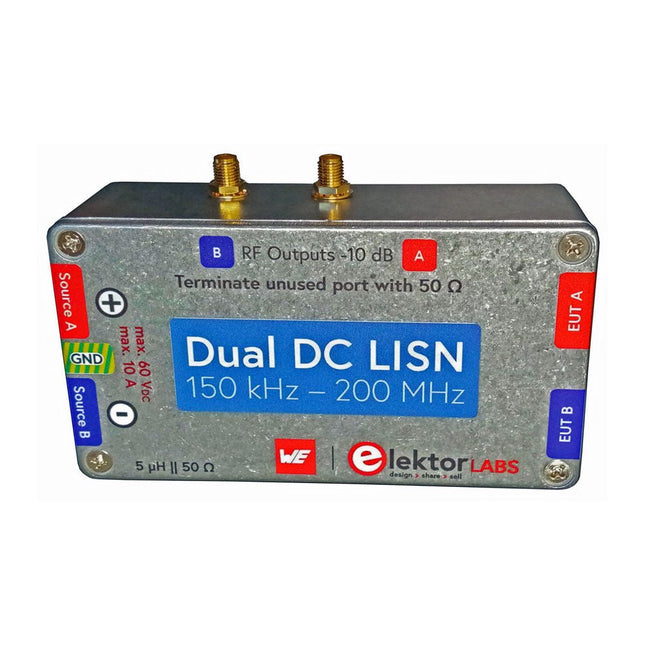
Elektor Labs Elektor Dual DC LISN (150 kHz - 200 MHz)
Het meten van conducted emission is de eenvoudigste en meest betaalbare methode om een indicatie te krijgen of een ontwerp aan de EMI/EMC eisen kan voldoen. Een Line Impedance Stabilization Network (LISN) is daarbij een onmisbaar onderdeel van een EMC pre-compliance testopstelling. Elektor heeft in samenwerking met Würth Elektronik een 5 µH, 50 Ω Dual DC LISN ontwikkeld die geschikt is voor spanningen tot 60 V en stromen tot 10 A. Het instrument meet RF-interferenties op beide kanalen (de voeding) door middel van 5 µH blokkeerspoelen. De interne 10 dB verzwakkingstrap – één per kanaal – bevat een 3e orde hoogdoorlaatfilter met een afsnijfrequentie van 9 kHz om de ingang van instrumenten zoals een spectrum analyzer te beschermen tegen mogelijk schadelijke DC spanningen of lage frequenties afkomstig van de DUT (Device Under Test). Specificaties RF-pad Kanalen 2 (met clamping diodes) Bandbreedte 150 kHz – 200 MHz Impedantie 5 µH || 50 Ω Interne demping 10 dB Connectoren SMA DC-pad Max. stroom < 10 ADC Max. spanning < 60 VDC DC weerstand < 2 x 70 mΩ PCB-formaat 94,2 x 57,4 mm Connectoren 4 mm banaan Hammond-behuizing Type 1590N Afmetingen 121 x 66 x 40 mm Inbegrepen 1x 4-laags PCB met alle SMT-onderdelen gemonteerd 1x Voorgeboorde behuizing met bedrukt frontpaneel 5x Vergulde, geïsoleerde 4 mm banaanstekers, geschikt voor 24 A, 1 kV 1x Hammond-behuizing 1590N1, aluminium (gegoten legering) Meer info Project op Elektor Labs: Dual DC LISN for EMC pre-compliance testing Elektor 9-10/2021: EMC Pre-Compliance Test voor uw DC-gevoed project (deel 1) Elektor 11-12/2021: EMC Pre-Compliance Test voor uw DC-gevoed project (deel 2)
€ 159,95€ 129,95
Leden identiek
-
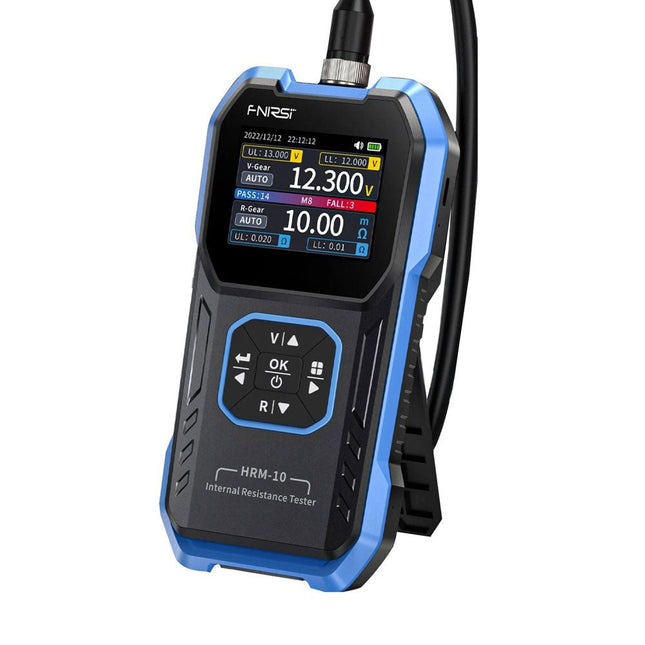
FNIRSI FNIRSI HRM-10 Interne weerstands- en spanningstester voor batterijen
De FNIRSI HRM-10 is een draagbare, zeer nauwkeurige interne weerstands- en spanningstester voor batterijen. Dit apparaat biedt echte vierdraadsmetingen en is ontworpen voor zowel nauwkeurigheid als gebruiksgemak. Het meet automatisch tegelijkertijd de interne weerstands- en spanningswaarden en geeft de resultaten op het HD-kleurenscherm weer. Gebruikers hebben de mogelijkheid om het spannings- en weerstandsbereik handmatig aan te passen aan hun behoeften. Het apparaat bevat ook een sorteermodus die automatisch de goede en slechte batterijen filtert op basis van door de gebruiker ingestelde drempels. Bovendien ondersteunt het de opslag van historische gegevens en is het mogelijk meetgegevens in tabelformaat te exporteren. Kenmerken Hoge meetnauwkeurigheid Tabelgegevens exporteren Meetresultaten automatisch evalueren 8 drempelinstellingen HD-kleurenscherm Opvouwbare standaard 1000 mAh lithiumbatterij Specificaties Spanning Weerstand Meetbereik 0-100 V (DC) 0-200 Ω Nauwkeurigheid ±0,5% ±0,5% Uitrusting Automatisch, 1 V, 10 V, 100 V Automatisch, 20 mΩ, 200 mΩ, 2 Ω, 20 Ω, 200 Ω Instrumenttestsignaalfrequentie 1 Khz (AC) Oplaadbaar USB-C (5 V/1 A) Ingebouwde batterij 1000 mAh lithiumbatterij Gebruikerskalibratie Ja Sorteermodus Ja Geschiedenisrecord Ja Export van opgenomen gegevens Ja Werkomgeving –10°C tot +45°C, relatieve vochtigheid <80% Opslagomgeving –20°C tot +80°C, relatieve vochtigheid <80% Afmetingen 158,7 x 80,5 x 28,4 mm Gewicht 225 g Inbegrepen 1x FNIRSI HRM-10 interne weerstandstester 1x Clip-testlijn 1x USB-C datakabel 1x Manual Downloads Manual Firmware V0.3
-
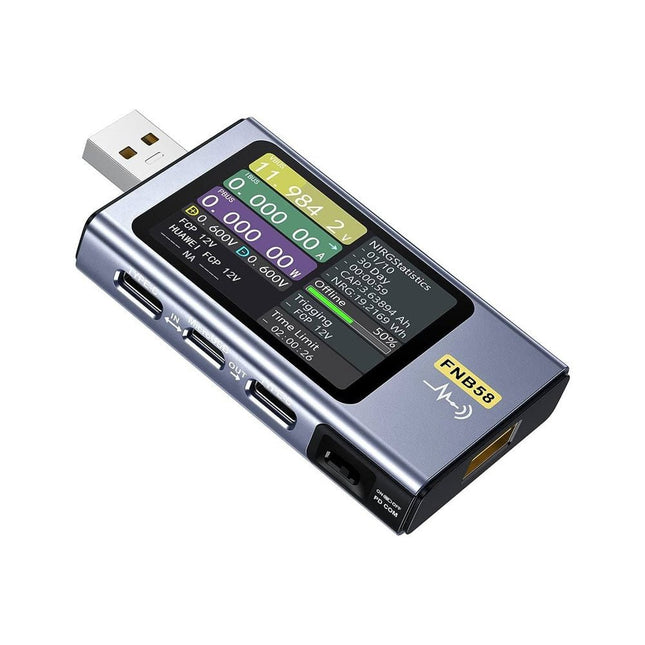
FNIRSI FNIRSI FNB58 USB-tester (met Bluetooth)
De FNB58 USB-tester (met Bluetooth) is een uitgebreide en zeer nauwkeurige USB spannings- en stroommeter. Hij beschikt over een 2,0" full-color HD TFT-display, ingebouwde USB-A, micro-USB en USB-C interface. Met dit apparaat kunt u de voeding of het stroomverbruik van producten meten, of het laadvermogen van mobiele telefoons en voedingen bepalen. Ook kunt u het snellaad protocol van laders in kaart brengen. Kenmerken USB-A en USB-C interface 2,0 inch HD-display Alle gegevens in één oogopslag Brede compatibiliteit Ultra nauwkeurige gegevensdetectie Speel met snellaad technologie Automatische protocol detectie (PD2.0, 3.0, 3.1, PPS, QC2.0, 3.0, FCP, SCP, AFC, PE, DASH VOOC, SuperVOOC en meer) Eenvoudige gebruikersinterface, eenvoudig te bedienen 4 functiecurve weergaves (real-time spannings- en stroomcurve, offline curve-opname, D+/D- spanningscurve, snelle meting van de rimpelspanning van de voeding) Kabeldetectie 10 groepen berekeningen van de accucapaciteit energieopslag Op PC aan te sluiten voor datalogging en firmware-updates Bluetooth-app voor Android-apparaten Specificaties Spanningsbereik 4-28 V Stroombereik 0-7 A Vermogensbereik 0-120 W Equivalente waardes interne weerstand bij belasting 0-9999,9 ? D+/D- spanning 0-3,3 V Capaciteit 0-9999,99 Ah Stroomverbruik 0-9999,99 Wh Kabel weerstand 0-9999,9 ? Interfaces micro-USB, USB-A, USB-C Afmetingen 42 x 13 x 82 mm Downloads Manual Firmware V0.68
-
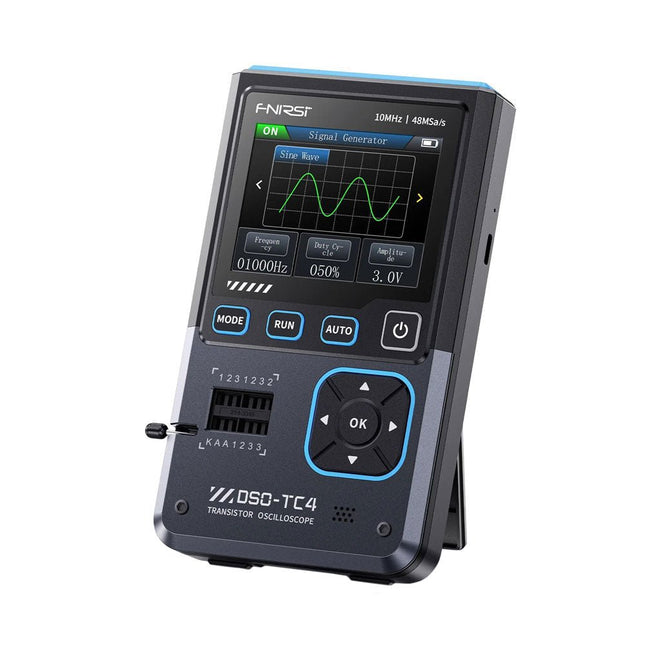
FNIRSI FNIRSI DSO-TC4 (3-in-1) Oscilloscoop (10 MHz) + Transistortester + Signaalgenerator
De FNIRDSI DSO-TC4 is een multifunctionele transistor-oscilloscoop die zowel uitgebreid als praktisch is. Het is ontworpen voor gebruik in onderhouds- en R&D-toepassingen, waarbij een oscilloscoop, transistortester en signaalgenerator in één apparaat worden geïntegreerd. Kenmerken Uitgerust met een 2,8-inch TFT-kleurenscherm voor een helder en intuïtief display Ingebouwde oplaadbare lithiumbatterij met hoge capaciteit (1500 mAh) met een stand-bytijd van maximaal 4 uur Compact en lichtgewicht, ideaal voor mobiel gebruik Specificaties Oscilloscoop Analoge bandbreedte 10 MHz Real-time bemonsteringsfrequentie 48 MSa/s Ingangsimpedantie 1 MΩ Koppelingsmodus AC/DC Testspanningsbereik 1:1-sonde: 80 Vpp (+40 V) 10:1 Sonde: 800 Vpp (+400 V) Verticale gevoeligheid 10 mV/div~10 V/div (X1-bereik) Verticale verplaatsing Instelbaar met indicatie Tijdbasisbereik 50ns~20s Triggermodus Auto/Normal/Single Triggertype Rising edge, Falling edge Triggerniveau Instelbaar met indicatie Waveform Freeze Ja (HOLD-functie) Automatische meting Max, Min, Avg, RMS, Vpp, Frequency, Cycle, Duty Cycle Transistortester Transistor Versterkingsfactor "hfe"; Basis-emitterspanning "Ube", Ic/Ie, collector-emitter omgekeerde lekstroom "Iceo", Ices, voorwaartse spanningsval van beschermingsdiode "Uf" Diode Voorwaartse spanningsval <5 V (voorwaartse spanningsval, junctiecapaciteit, omgekeerde lekstroom) Zenerdiode 0,01~32 V Omgekeerde doorslagspanning (K-A-A-testgebied) Veldeffecttransistor (FET) JFET: Gatecapaciteit "Cg", Drainstroom Id onder "Vgs", voorwaartse spanningsval van beschermingsdiode "Uf" IGBT: Drainstroom Id onder Vgs, Voorwaartse spanningsval van beschermingsdiode Uf MIOSTET: Drempelspanning "Vt", Gatecapaciteit "Cg", Drain-Sourceweerstand "Rds", Voorwaartse spanningsval van beschermingsdiode "Uf" Unidirectionele SCR Triggerspanning <5V, Gateniveau (Gatespanning) Bidirectionele SCR Triggerstroom <6mA (Gatespanning) Condensator 25pF~100mF, Capaciteitswaarde, Verliesfactor "Vloss" Weerstand 0,01Ω~50MΩ Inductor 10μH~1000μH, DC-weerstand DS18B20 Temperatuursensor, pinnen: GND, DQ, VDD DHT11 Temperatuur- en vochtigheidssensor, pinnen: VDD, DATA, GND Signaalgenerator Uitgangsgolfvorm Ondersteunt 13 golfvormuitgangen Golfvormfrequentie 0-50 KHz Vierkante golf-inschakelduur 0-100% Golfvormamplitude 0,1-3,0 V Algemeen 2,8-inch TFT-kleurenscherm Achtergrondverlichting Helderheid instelbaar Voeding USB-C (5 V/1 A) Batterij 3,7 V/1500 mAh Talen Engels, Duits, Spaans, Portugees, Russisch, Chinees, Japans, Koreaans Afmetingen 90 x 142 x 27,5 mm Gewicht 186 g Inbegrepen 1x FNIRSI DSO-TC4 (3-in-1) Oscilloscoop (10 MHz) 1x P6100-oscilloscoopsonde (10X) 1x Krokodillenklemsonde 3x Testhaken 1x Adapter 1x USB-C-oplaadkabel 1x Manual Downloads Manual Firmware V0.0.3 (+V1.0.9)
€ 89,95€ 69,95
Leden identiek
-
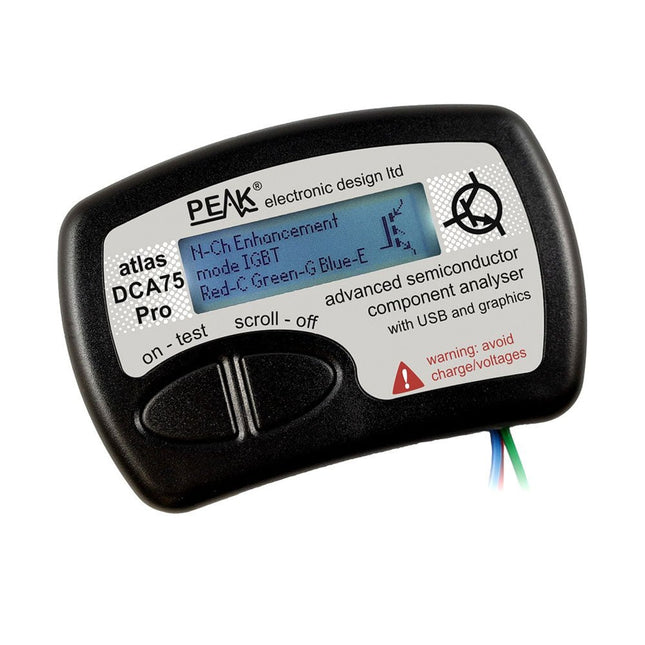
Peak Peak Atlas DCA75 Pro (Advanced Semiconductor Analyzer)
The DCA75 Pro is a great instrument that combines ease-of-use with amazing features. It can automatically identify a huge range of semiconductors, automatically identify pinouts and measure detailed parameters. Kenmerken Built-in graphics display (now backlit) to show detailed schematic of the component you're testing as well as pinout and measurement data. USB connectivity to allow curve tracing, data storage/retrieval and device matching on your Windows PC (Windows 7 and higher). Single internal AAA alkaline cell for standalone operation. Component Support Bipolar transistors (NPN/PNP inc Silicon/Germanium) Darlington transistors (NPN/PNP) Enhancement mode MOSFETs (N-Ch and P-Ch) Depletion mode MOSFETs (N-Ch and P-Ch) Junction FETs (N-Ch and P-Ch). Both symmetrical and asymmetrical types Enhancement IGBTs (N-Ch and P-Ch) Diodes and diode networks (2 and 3 lead types) Zener diodes (up to about 9 V) Voltage regulators (up to about 8 V) LEDs and bi-colour LEDs (2 lead and 3 lead types) Low power sensitive Triacs and Thyristors (<10 mA trigger and hold) Measurements BJT current gain (hFE) BJT base emitter voltage (Vbe) BJT collector leakage current MOSFET on and off gate threshold voltages MOSFET transconductance JFET pinch-off voltage JFET transconductance JFET IDSS (drain current for Vgs=0) IGBT on and off gate threshold voltages IGBT transconductance Voltage regulator output voltage Voltage regulator quiescent current consumption Voltage regulator drop-out voltage Zener voltage Diode forward voltage drop Specificaties Analyzer type Semiconductor components Component detection Automatic Pinout detection Automatic, connect any way round Display type Graphic LCD (now backlit) Interface type USB for optional PC connection PC functions Curve tracing (Windows 7 and higher) Software Included on USB drive for Windows 7 and higher Battery Single AAA cell (supplied) Inbegrepen Peak Atlas DCA75 Pro PC software on a USB Flash Drive for Windows 11, 10, 8, 7, XP Micro USB cable Fitted universal premium hook probes AAA Alkaline battery Downloads Datasheet (EN) User Guide (EN) Software Installation Guide (EN) Software and Firmware Package
-
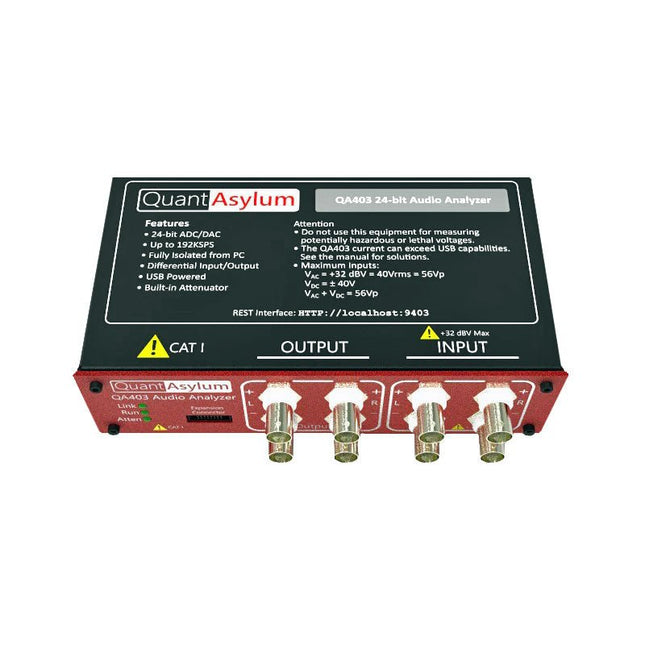
QuantAsylum QuantAsylum QA403 24-bit Audio Analyzer
De QA403 is de vierde generatie audio analyzer van QuantAsylum. Deze QA403 verhoogt de functionaliteit van de QA402 met verbeterde ruis- en vervormingsprestaties, en ook een vlakkere respons aan de randen van de band. Het compacte formaat van de QA403 zorgt ervoor dat u hem vrijwel overal mee naartoe kunt nemen. Kenmerken 24-bits ADC/DAC Tot 192 kS/s Volledig geïsoleerd van de PC Differentiële input/output USB gevoed Ingebouwde demping Snel opstarten en geen stuurprogramma De QA403 is een USB-apparaat zonder stuurprogramma's, wat betekent dat hij meteen operationeel is zodra u hem aansluit. De software is gratis, en u kunt snel en gemakkelijk de hardware van de ene machine naar de andere verplaatsen. Dus als u naar een vestiging moet om een probleem op te lossen, of de QA403 mee naar huis dient te nemen op een thuiswerkdag, dan kunt u dit zonder veel gedoe doen. No-Cal ontwerp De QA403 wordt geleverd met een fabriekskalibratie in het flashgeheugen, waardoor consistente prestaties bij gebruik van meerdere analyzers kan worden gegarandeerd. Op uw productielijn kunt u een andere QA403 installeren en erop vertrouwen dat wat u op de ene analyzer leest overeenkomt met de andere. Er hoeft dus niet geregeld herkalibratie plaats te vinden. Metingen Het uitvoeren van basismetingen kan snel en eenvoudig. In een paar klikken krijgt u inzicht in de frequentierespons, de THD (+ N), de versterking, de SNR, en andere gegevens van uw geteste apparaat. Dynamisch bereik De QA403 biedt 8 gradaties aan versterking op de ingang (0 tot +42 dBV in 6 stappen) en 4 stappen versterking op de uitgang (-12 tot +18 dBV in stappen van 10 dB). Dit zorgt voor consistente prestaties over zeer brede in- en uitgangsniveaus. De maximale AC ingangsspanning op de QA403 is +32 dBV = 40 Vrms. De maximale DC is ±40 V en de maximale ACPEAK + DC = ±56 V. Eenvoudig te programmeren De QA403 ondersteunt een REST-interface, waardoor het eenvoudig is om metingen te automatiseren in vrijwel elke taal. Van Python tot C++ tot Visual Basic: als u weet hoe u een webpagina in uw favoriete taal moet laden dan kunt u al de QA403 op afstand bedienen. Metingen zijn snel en responsief, doorgaans met het verwerken van tientallen opdrachten per seconde. Geïsoleerd, en gevoed via USB De QA403 werkt geïsoleerd van de pc, wat betekent dat u echt uw te testen apparaat meet, en niet met een fantoom aardlus te doen heeft. De QA403 wordt gevoed via USB, zoals bijna alle QuantAsylum instrumenten. Indien u op afstand moet configureren, neem dan een hub met voeding mee in uw tas en uw hele testopstelling kan dan functioneren met een minimum aan kabels. Vaarwel geluidskaart, hallo QA403 Moe van het proberen om een geluidskaart aan de praat te krijgen? Nachtmerries van het kalibreren? Gemis van de juiste versterking? Of te weinig aansturing? Bent u het zat om met vaste ingangsranges om te gaan? Of bang dat u zaken kapot maakt met te veel DC of AC? Moe van de aardlussen? Dáarom heeft QuantAsylum de QA403 ontworpen. Specificaties Afmetingen 177 x 44 x 97 mm (B x H x D) Gewicht 435 g Case Materiaal Aluminium met poedercoating (2 mm dik voorpaneel, 1.6 mm dikke boven/onderkant) Downloads Datasheet Gebruikershandleiding GitHub
-
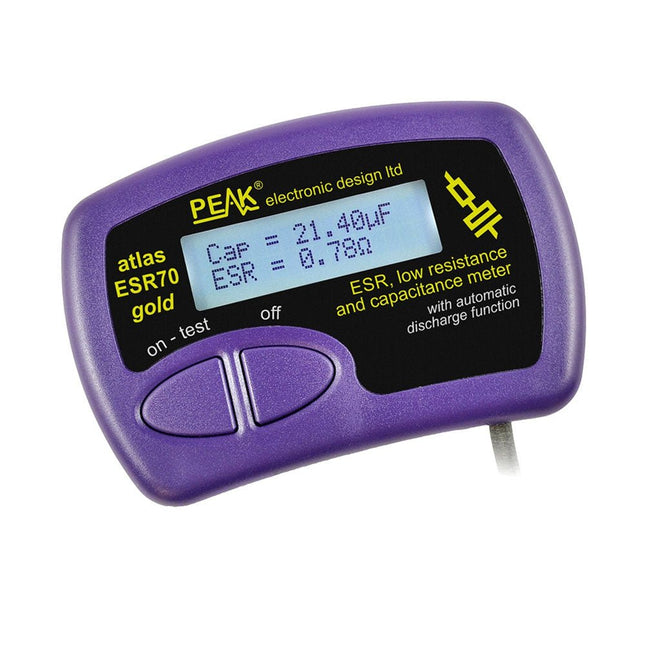
Peak Peak Atlas ESR70 gold (ESR- en capaciteitsmeter)
The Peak Atlas ESR70 gold is an enhanced version of the previous Peak Atlas ESR70 Plus. It does everything that the ESR70 Plus did but better. It now measures capacitance up to 10x faster, and over a wider range, thanks to new test algorithms. The capacitance measurement is also much less influenced by parallel resistances or leakage current thanks to our new Triple-Slope measurement system. Using the supplied gold plated probes (removable), the Atlas ESR70 gold can measure ESR down to a resolution of 0.01 ohms, up to 40 ohms. It can even measure ESR for capacitors that are in-circuit. Probes are removable, allowing 2 mm compatible probes to be fitted. Audible alerts are produced for various ESR levels allowing you to perform many tests in succession without having to look at the display. The ESR70 automatically takes capacitive reactance into account, so even low value capacitors (down to 0.3 uF) can have the ESR measured accurately. Kenmerken Uses a single AAA Alkaline cell (included). Alphanumeric LCD with backlight. Automatic analysis-start when you apply the probes. Automatic capacitor discharge using controlled discharge function. ESR (and low DC resistance) measurement (even in-circuit). Capacitive reactance automatically taken into account to ensure accurate ESR. Capacitance measurement (if testing out-of-circuit). Audible alerts for various ESR levels. Extended ESR measurement range up to 40 Ohms. Optional probe alternatives easily fitted. New gold Features Improved LCD with better backlight. 10x faster capacitance measurement for large capacitors. Enhanced user options system. New triple-slope measurement system to vastly reduce the influence of parallel resistance and/or leakage current on capacitance measurements. Much wider capacitance measurement range now 0.3 uF to 90,000 uF (was 1uF to 22,000uF). Specificaties Analyzer type ESR and Capacitance Component types Capacitors (>0.3 uF) ESR range 0.00 Ohms to 40.0 Ohms ESR resolution From 0.01 Ohms In-circuit use ESR only Capacitance range 0.3 uF to 90000 uF Battery type 1.5 V Alkaline AAA Cell (supplied). Life typically 1500 ops Display type Alphanumeric LCD (with backlight) Inbegrepen Peak Atlas ESR70 gold Extra-long and extra-flexible test cables (450 mm of Silicone covered cable) 2 mm gold plated plugs and sockets with removeable gold plated crocodile clips Comprehensive illustrated user guide AAA Alkaline cell Downloads Datasheet (EN) User Guide (EN)
-
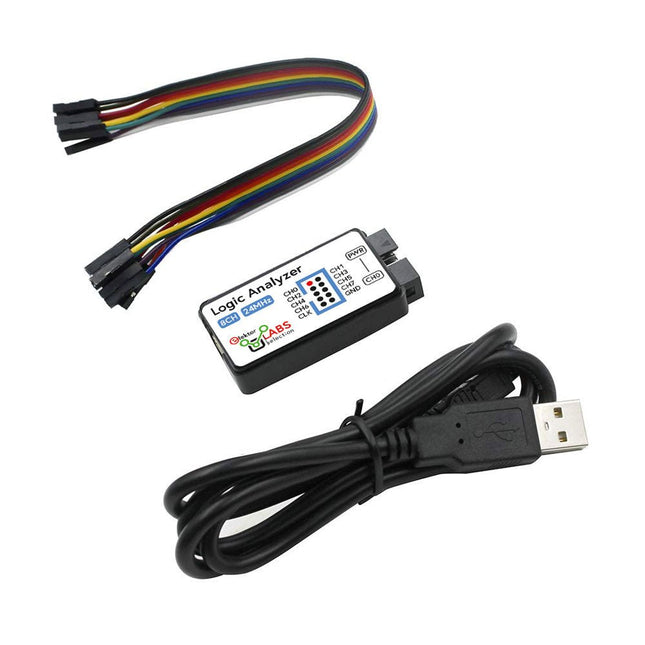
Elektor Labs USB Logic Analyzer (8-ch, 24 MHz)
Deze USB Logic Analyzer is een 8-kanaals logic analyzer met elke ingang bedoeld voor het op twee manieren opnemen van analoge data. Hij is perfect voor het debuggen en analyseren van signalen zoals I²C, UART, SPI, CAN en 1-Wire. De analyzer bemonstert een digitale ingang die is aangesloten op een te testen apparaat (DUT) met een hoge bemonsteringssnelheid. De aansluiting op de PC gaat via USB.Specificaties Kanalen 8 digitale kanalen Maximale bemonsteringssnelheid 24 MHz Maximale ingangsspanning 0 V ~ 5 V Bedrijfstemperatuur 0°C ~ 70°C Ingangsimpedantie 1 MΩ || 10 pF Ondersteunde protocollen I²C, SPI, UART, CAN, 1-wire, enz. PC-aansluiting USB Afmetingen 55 x 28 x 14 mm Inbegrepen USB Logic Analyzer (8-kanaals, 24 MHz) USB-kabel Jumper Draad Lintkabel DownloadsSoftware
-
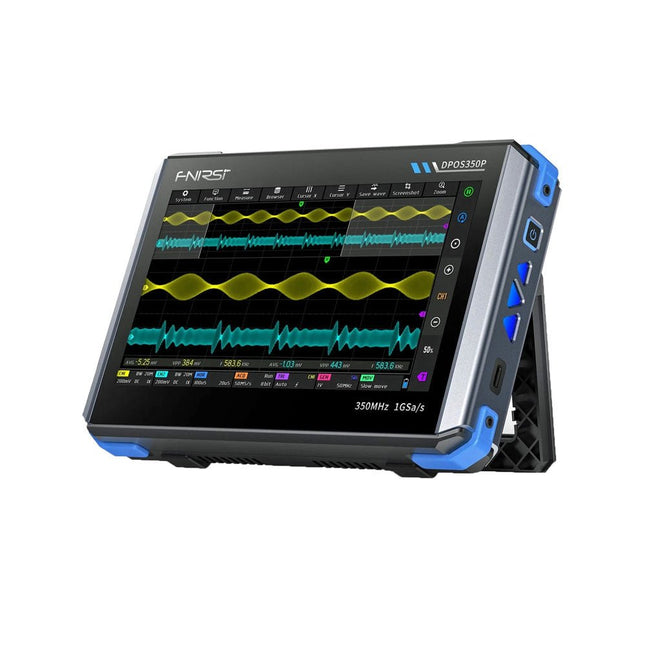
FNIRSI FNIRSI DPOS350P (4-in-1) 2-kanaals Tablet-oscilloscoop (350 MHz) + Signaalgenerator + Frequentieresponsanalyzer + Spectrumanalyzer
2 kanalen • 350 MHz • 1 GSa/s • 50.000 wfm/s • 7 inch Touchscreen De FNIRSI DPOS350P is een gestroomlijnde 4-in-1 krachtpatser in tabletvorm! Dit compacte en draagbare apparaat biedt serieuze functionaliteit: het combineert een 2-kanaals oscilloscoop (350 MHz), een signaalgenerator (50 MHz), een frequentieresponsanalyzer (50 MHz) en een spectrumanalyzer (200 kHz–350 MHz) – alles in één apparaat. Of u nu bezig bent met R&D, probleemoplossing of veldtesten, de DPOS350P biedt de tools die u nodig hebt om elektronische signalen nauwkeurig en helder te meten, genereren, analyseren en visualiseren. Het responsieve touchscreen met hoge resolutie en de intuïtieve bediening maken signaalanalyse snel, flexibel en efficiënt. Kenmerken Krachtige multifunctionele integratie 350 MHz 2-kanaals oscilloscoop met 1 GSa/s realtime sampling 50 MHz signaalgenerator met 14 standaard + aangepaste golfvormen Spectrum analyzer (200 kHz–350 MHz): Perfect voor EMI, RF en HF-testen Frequentieresponsanalyzer (FRA) tot 50 MHz Hoogwaardige golfvormregistratie Vernieuwingsfrequentie van 50.000 wfm/s voor realtime signaalhelderheid Bandbreedte van 350 MHz (enkelkanaalsmodus) Detecteert zeldzame en onwaarschijnlijke afwijkingen Scherp display & Soepele werking 7" IPS-touchscreen (resolutie 1024 x 600) Schakelen tussen grijstinten- en kleurtemperatuurweergave Eenvoudig te bedienen in verschillende testomgevingen Betrouwbaar, beveiligd en snel opladen Hoogspanningsbeveiliging tot 400 V Snel opladen met QC 18 W (volledig opladen in 2 uur) Gebouwd voor stabiele, langdurige werking Gegevensopslag en -export Sla tot 500 golfvormrecords + 90 screenshots op USB-export voor eenvoudige rapportage en offline analyse Specificaties Algemeen Scherm 7 inch (IPS, volledige kijkhoek) Resolutie 1024 x 600 pixels Interactiemodus Capacitief touchscreen Totaal stroomverbruik 10 W Inschakelconfiguratie 5 voorinstellingen Opladen QC 18 W, 12 V/1,5 A (USB-C) Accu 3,7 V, 8000 mAh lithiumbatterij Accuduur ca. 3 uur in gebruik, 5 uur stand-by Warmteafvoer Luchtkoeling Uitbreidingsinterface USB-poort Automatische uitschakeling 15 tot 60 minuten / uit Firmware-upgrade Ondersteunt .iso-image-upgrade Talen Engels / Portugees / Russisch / Chinees Afmetingen 190 x 128 x 37 mm Oscilloscoop Analoge kanalen 2 Analoge bandbreedte 350 MHz Stijgtijd 1 ns Real-time bemonsteringsfrequentie 1 GSa/s Geheugendiepte 60 Kpts Ingangsimpedantie 1 MΩ / 14PF Tijdbasisbereik 5 ns ~ 50 s Roltijdbasis 50 ms ~ 50 s Verticale gevoeligheid 2 mV ~ 20 V (1X) Verticaal bereik 16 mV ~ 160 V (1X) DC-nauwkeurigheid ±2% Tijd nauwkeurigheid ±0,01% Ingangskoppeling DC / AC Probe-verzwakking 1X / 10X / 100X Hardwarebandbreedtelimiet 150M / 20M Hoge-resolutiemodus 8 bit ~ 16 bit Parametermetingen 12 typen Cursormeting Tijd, periode, frequentie, niveau, spanning Triggerdetectie Digitale trigger Triggerkanaal CH1 / CH2 Triggermodus Auto / Single / Normal Triggerflank Rising edge / Falling edge Triggeronderdrukking L1 ~ L3 Triggerniveau Handmatig / automatisch 10% ~ 90% Screenshot-opslag 90 afbeeldingen Golfvormopslag 500 groepen Achtergrondraster Weergeven/verbergen Golfvormbeweging Grof/fijn afstellen Overspanningsbeveiliging Bestandsspanning 400 V Helderheid golfvorm Instelbaar Eenvoudig FFT-display Ja Digitale fluorescentie Ja Kleurtemperatuurweergave Ja X-Y-modus Ja ZOOM-tijdbasis Ja Automatische aanpassing met één druk op de knop Ja Terug naar nul met één druk op de knop Ja Gegevensbrowser Ja Signaalgenerator Golfvormtypen 14 standaardfuncties + vastgelegde golfvorm Frequentie 0~50 MHz (alleen sinusgolf, andere golfvormen tot 10M/5M/3M) Amplitude 0~5 VPP Offset -2,5 V ~ +2,5 V Bedrijfstype cyclus 0,1~99,9% Frequentieresolutie 1 Hz Amplituderesolutie 1 mV Offsetresolutie 1 mV Inschakelduurresolutie 0,1% Aanpasbare vastgelegde golfvorm 500 groepen Frequentieresponsanalyzer (FRA) Frequentie van het excitatiesignaal 100 Hz ~ 50 MHz Ampitude van het excitatiesignaal 0~5 VPP Offset van het excitatiesignaal -2,5 V ~ +2,5 V Aantal excitatiefrequenties 20~500 Cursormeting Frequentie / versterking / fase Bedrijfsmodus Enkelvoudig / cyclisch Systeemkalibratie Ja Spectrumanalyzer Conversiemethode FFT FFT-lengte 4K ~ 32K Frequentiebereik 200 kHz ~ 350 MHz Niveaubereik -60 dBmV ~ +260 dBmV Cursormeting Frequentie / amplitude Markeringsparameter Maximale energieharmonischen Watervalgrafiek Ja 3D-watervalgrafiek Ja Automatische afstelling Ja Systeemkalibratie Ja Inbegrepen 1x FNIRSI DPOS350P (4-in-1) 2x 350 MHz-sondes 1x QC 18 W snellader (EU) 1x USB-datakabel 1x Krokodillenklem 1x Opbergtas 1x Manual Downloads Manual Firmware
-
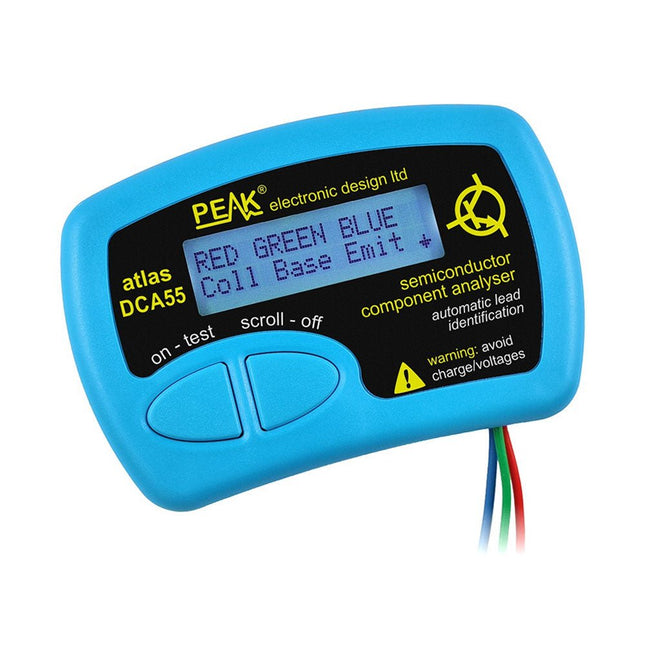
Peak Peak Atlas DCA55 Semiconductor Analyzer
The Peak Atlas DCA55 is great for automatically identifying the type of semiconductor on the test leads as well as the pinout and many other parameters. Supports transistors MOSFETs, JFETs (gate pin only can be identified), diodes, LEDs and lots more. Automatically identifies type of component, pinout and other important parameters. Now features transistor leakage measurement and Germanium/Silicon identification. Component Support Bipolar transistors (NPN/PNP inc Silicon/Germanium) Darlington transistors (NPN/PNP) Enhancement mode MOSFETs (N-Ch and P-Ch) Depletion mode MOSFETs (N-Ch and P-Ch) Junction FETs (N-Ch and P-Ch). Only gate lead identified. Diodes and diode networks (2 and 3 lead types). LEDs and bi-colour LEDs (2 lead and 3 lead types). Low power sensitive Triacs and Thyristors (<5 mA trigger and hold) Measurements Part type identification Pinout identification BJT current gain (hFE) BJT base emitter voltage (Vbe) BJT collector leakage current MOSFET gate threshold voltage Diode forward voltage drop (Vf) Specificaties Analyzer type Transistors, Diodes, LEDs, MOSFETs, JFETs Pinout detection Full pinout (only Gate on JFETs) Pinout configuration Connect any way round Transistor measurements Vbe, hFE, Iceo MOSFET measurements Vgs(on) Diode measurements Vf Probe type Universal grabber type Battery Single AAA cell (supplied). Life typically 1300 ops Test conditions Typically 5 mA, 5 V peak Display type Alphanumeric LCD (with backlight) Inbegrepen DCA55 Semiconductor Component Analyser instrument Comprehensive illustrated user guide Fitted universal hook probes AAA Alkaline battery Downloads Datasheet (EN) User Guide (EN)
-
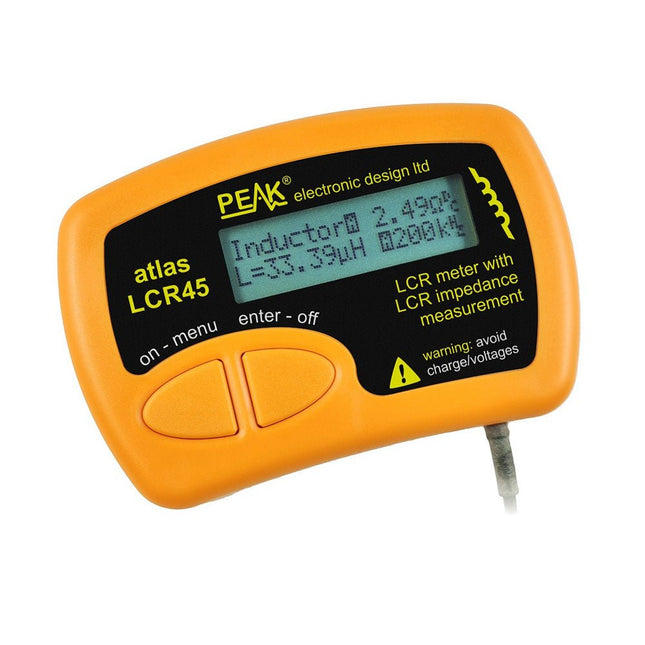
Peak Peak Atlas LCR45 LCR-meter
The LCR45 does everything that the popular LCR40 does, but it has some significant enhancements. The LCR45 features a new high capacity micro and high resolution ADCs. LCR45 incorporates advanced maths, based on Complex Impedance analysis. This allows for enhanced component value measurement as well as a comprehensive and detailed impedance display. Kenmerken Supplied with gold plated removable hook probes. Fluid measurements with hold function. Automatic or manual component type. Automatic or manual test frequency, DC, 1 kHz, 15 kHz or 200 kHz. Enhanced measurement resolution: 0.2 µH, 0.2 pF and 0.2 Ohms. Easy menu system for user settings. Enhanced compensation for component parasitics and losses (such as core losses etc). Automatic or manual power-off. Specificaties Analyser type LCR and component impedance Component types Auto/Manual for L,C & R Measurement types Inductance, Capacitance and Resistance Other measurements Complex impedance/admittance More measurements Magnitude and Phase of impedance Inductance range 0uH to 2H Capacitance range 0 pF to 10000 uF Resistance range 0R to 2MR Test frequency Auto and manual: DC, 1 kHz, 15 kHz, 200 kHz Display type Alphanumeric LCD (not backlit) Measurement scheme Continuous (with optional hold) Battery GP23 (12 V/55 mAH type), ~700 ops Inbegrepen LCR45 Passive Component Impedance Meter 2 mm plugs and sockets and removeable hook probes Comprehensive illustrated user guide 2 Batteries, one installed and one spare. GP23 Alkaline battery. (12 V/55 mAH) Downloads Datasheet (EN) User Guide (EN)
-
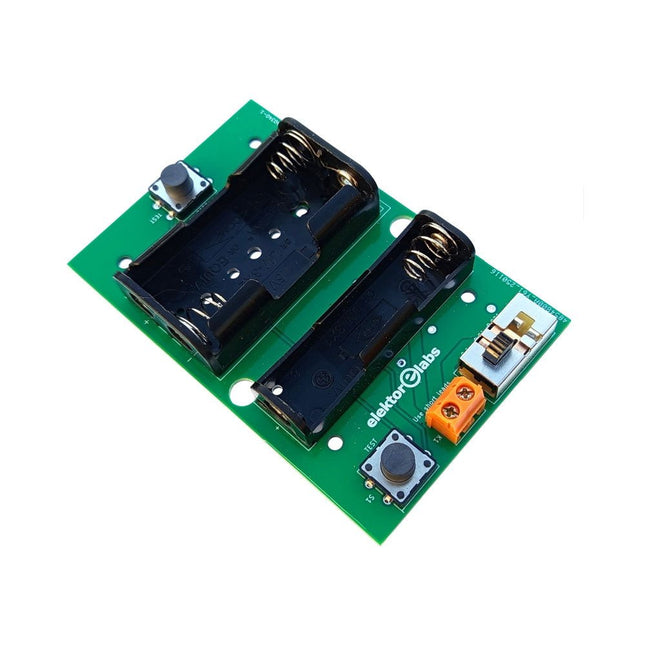
Elektor Labs Elektor Milliohmmeter Adapter
De Elektor Milliohmmeter Adapter gebruikt de precisie van een multimeter om zeer lage weerstandswaarden te meten. Het is een adapter die een weerstand omzet in een spanning die kan worden gemeten met een standaard multimeter. De Elektor Milliohmmeter Adapter kan weerstanden meten onder 1 mΩ met behulp van een 4-draads (Kelvin) methode. Het is handig voor het lokaliseren van kortsluitingen op printplaten (PCB). De adapter heeft drie meetbereiken – 1 mΩ, 10 mΩ en 100 mΩ – selecteerbaar via een schuifschakelaar. Het bevat ook ingebouwde kalibratieweerstanden. De Elektor Milliohmmeter Adapter wordt gevoed door drie 1,5 V AA batterijen (niet meegeleverd). Specificaties Meetbereiken 1 mΩ, 10 mΩ, 100 mΩ, 0,1% Voeding 3x 1,5 V AA-batterijen (niet inbegrepen) Afmetingen 103 x 66 x 18 mm (compatibel met Hammond 1593N-type behuizing, niet inbegrepen) Speciale functie Geïntegreerde kalibratieweerstanden Downloads Documentation
€ 34,95€ 24,95
Leden identiek
-
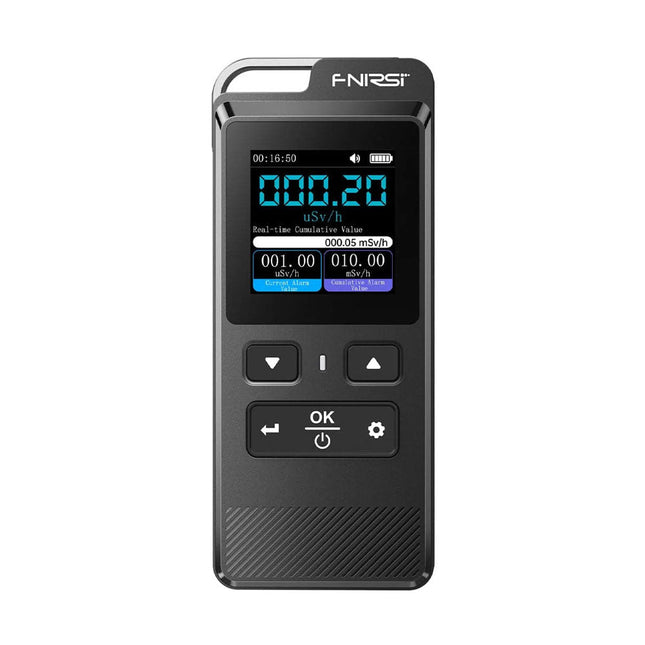
FNIRSI FNIRSI GC-02 Nucleaire Stralingsdetector (Geigerteller)
De FNIRSI GC-02 nucleaire stralingsdetector heeft een slank, draagbaar ontwerp met uiterst nauwkeurige Geiger-Müller-tellers voor nauwkeurige detectie van ioniserende straling (γ-straling, röntgenstraling, enz.). Het 1,5-inch HD LCD-scherm geeft real-time, gemiddelde, maximale en cumulatieve waarden weer. Functies omvatten alarminstellingen, aanpasbare slaap-/uitschakeltijden, getimede monitoring en geschiedenisweergave met maximaal 10 opgeslagen records. De oplaadbare batterij van 850 mAh is goed voor maximaal 6 uur gebruik. De FNIRSI GC-02 is compact en betrouwbaar en perfect voor detectie van nucleaire straling onderweg. Kenmerken Voedsel- en metaaldetectie Marmer- en ertsinspectie Detectie van radioactiviteit in de nucleaire industrie Het testen van radioactieve medische apparatuur Multifunctionele realtime monitoring Kerntechnologie: Geiger-Müller-teller Batterij met hoge capaciteit van 850 mAh Detector: GM-buis met energiecompensatie (Geigertellerbuis) Detectiestraaltypen: gammastraling, röntgenstraling, bètastraling Specificaties Detectiestralingstype Ioniserende straling (γ-straling, röntgenstraling, enz.) Detector Energiecompensatie GM-buis (geigertellerbuis) Huidige dosering 0,00-1000 μSv/u (1 mSv/u) Cumulatief dosisequivalent 0,00 μSv-500,0 mSv Energiebereik 48 keV-15 Mev ≤±30% (voor 137Cs -) Gevoeligheid 80 CPM/uSv (voor Co-60) Doseringseenheid μSv/u, μGy/u, mR/u, CPS, CPM Batterijcapaciteit 850 mAh Alarmmethode Licht, geluid Talen Chinees, Engels, Russisch, Duits, Japans, Portugees, Spaans, Koreaans Afmetingen 106,5 x 44,5 x 25 mm Inbegrepen 1x GC-02 Nucleaire stralingsdetector 1x USB-kabel 1x Lanyard-lus Downloads Manual
-
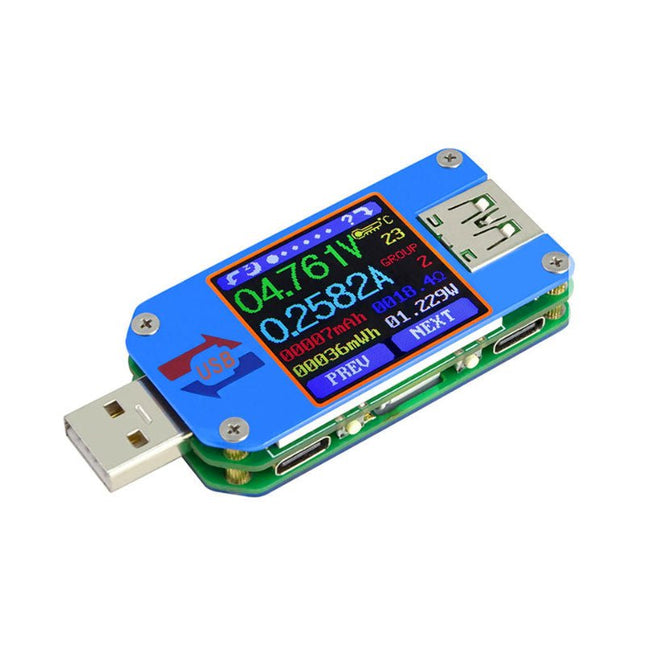
JOY-iT JOY-iT UM25C USB-meetapparaat
USB ports can be found not only at your computer at home but also at powerbanks, in the car or in the train. Although, not all ports are high-quality und deliever steady currents and voltages. The JT-UM25C allows to see all values. The measuring instrument supports additional functions like Quickcharge 2.0 and 3.0 as well as Apple 2.4 A, 2.1 A, 1 A, 0.5 A and Android DCP and offers an analysis through the radio interface. The area of measurement is up to 24 V and 5 A which makes it practical for all areas of application. The integrated 1.44' LCD-display can be regulated in five levels of brightness and offers an overview of all measured values at all time. Kenmerken Measuring device for USB applications Measured value output via LCD display Display of current, voltage, energy, power, voltage curve, internal resistance, temperature (int. sensor) Output via BT for evaluation on PC/Smartphone Supports: Quickcharge 2.0, QC 3.0, Apple 2.4 A/2.1 A/1 A/0.5 A Android DCP, Samsung Specificaties USB Ports USB 2.0, Micro USB, USB-C Measuring range 4-24 VDC / 0-5 A / 0-99h 59min 59 sec / -10-100°C Measuring accuracy 0.001 V / 0.0001 A Refresh rate 2 Hz Display LCD Color-Display with 5 brightness levels Display size 1.44' Communication Bluetooth connection (for evaluation on Smartphone + PC) Dimensions 71.2 x 30.5 x 12.4 mm Weight 23.7 g Downloads Manual Android APK Windows Software
-
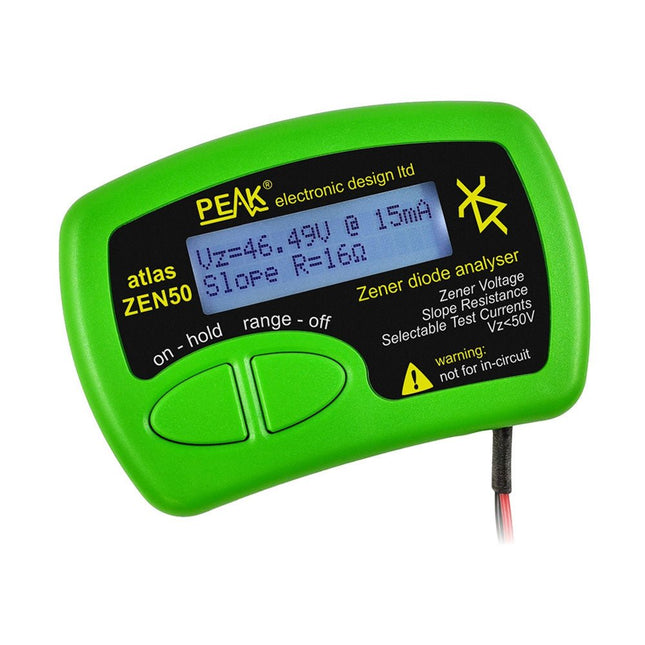
Peak Peak Atlas ZEN50 Zener Diode Analyzer
The Peak Atlas ZEN50 is ideal for testing Zener diodes (including avalanche diodes), transient suppressors, LEDs and LED strings. It generates constant current pulses (selectable from 2 mA, 5 mA, 10 mA and 15 mA) at voltages from 0V to 50V. So even high voltage Zeners or high voltage LED strings can be tested. Test currents are supplied in narrow pulses to ensure that the component under test remains at a constant temperature. The voltage of the part is displayed on the screen together with the test current and also a measure of the component's slope resistance (also known as dynamic impedance). Specificaties Analyzer type Zeners, LEDs, TVS etc Test currents 2 mA, 5 mA, 10 mA, 15 mA Voltage range 0.00 to 50.00 V Slope resistance range 0 to 8000 Ohms Battery type Single AAA (supplied). Life typically 1400 ops Test method Triple pulse burst @ 10pps (typ) Test current duty cycle 3% Display type Alphanumeric LCD (with backlight) Inbegrepen Peak Atlas ZEN50 Zener Diode Analyzer Fitted flexible test leads with gold plated crocs Comprehensive illustrated user guide AAA Alkaline battery Downloads Datasheet (EN) User Guide (EN)
-
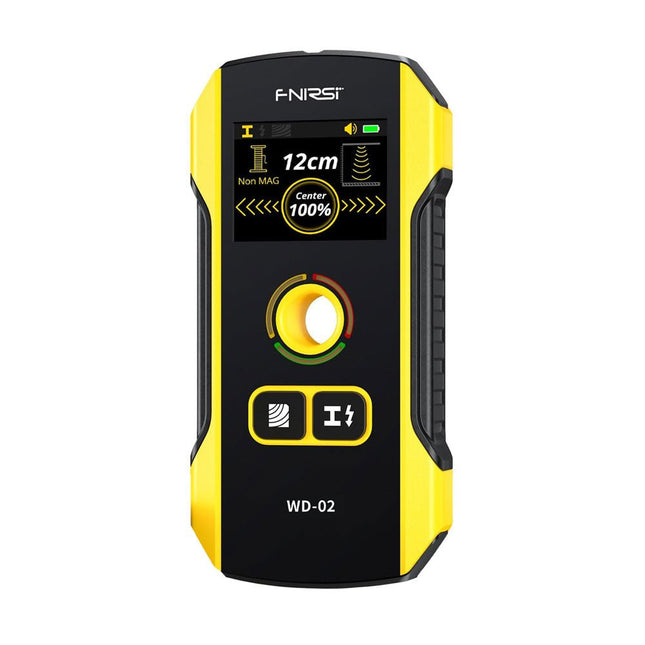
FNIRSI FNIRSI WD-02 Wall Detector Scanner
De FNIRSI WD-02 wanddetector is een verbeterde versie van de vorige WD-01 versie met een beter TFT-display met hoge resolutie, en een nieuwe gebruikersinterface met extra talen. De 3-voudige gevoeligheidsinstelling verhoogt de meetnauwkeurigheid. Hij kan worden gebruikt om stalen staven, metalen balken, metalen buizen, hout en draden in muren, plafonds en vloeren te detecteren. Er zijn 3 detectiemodi beschikbaar: detectie van metaal, hout en wisselspanning. Kenmerken Het kleine formaat van dit tool is erg handig voor dagelijks gebruik, je kunt hem ook gemakkelijk vasthouden tijdens het gebruik. Met deze wanddetector scanner kunt u snel de randen en het midden lokaliseren van metaal, balken, leidingen en stroomvoerende AC-kabels achter muren, vloeren en plafonds. Het meetbereik is ?38 mm voor hout, ?40 mm voor AC-kabels, ?100 mm voor metalen buizen en ?120 mm voor bewapeningsmetaal. De HPC detectiemodule biedt een betere bescherming tegen interferentie en een hogere rekensnelheid. Het scherm geeft de afstand tot het doel, het centrum daarvan en het materiaal. Het indicatielampje wordt geel of rood, afhankelijk van de afstand tot het doel, en het groene lampje betekent "Geen doel". Ook klinkt er een piep wanneer een doelwit wordt gedetecteerd. Wanneer het centrum van het doel is bereikt worden er continu waarschuwingen gegeven. Deze tool kan op grote schaal worden gebruikt bij huisdecoratie, wanddecoratie, installatie van huishoudelijke apparaten, wegenonderhoud, enz. Dankzij de centrale opening in het ontwerp kunt u de boorpositie na detectie direct markeren en zo nauwkeurig boren. Specificaties Maximale detectiediepte Metalen 120 mm Non-ferrometalen (koper) 100 mm AC-kabels 50 mm Enkelvoudig koperdraad 40 mm Hout Precisiemodus 20 mmDieptemodus: 38 mm Automatisch uitschakelen Na 5 minuten inactiviteit Voeding 300 mAh oplaadbare lithium accu, opladen via USB-C Afmetingen 138 x 68 x 22 mm Gewicht 122 g Inbegrepen FNIRSI WD-02 Wanddetector Scanner USB kabel Opbergtas Handleiding Downloads Manual
-
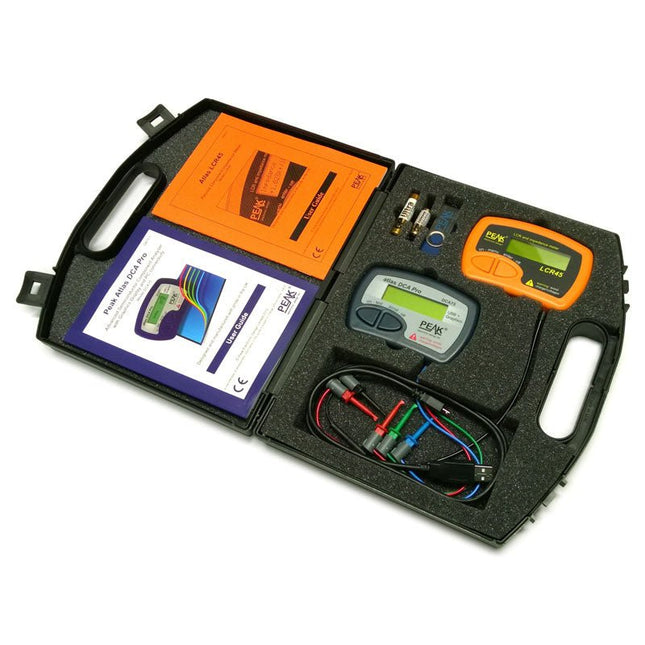
Peak Atlas Pro Pack (LCR45 & DCA75)
This pack contains the LCR45 Passive Component Impedance Meter, great for advanced hobbyists and professionals. It also contains the very popular DCA Pro (model DCA75), fantastic for component identification, pinout identification, detailed characteristic measurement and curve tracing on a PC. Complete with USB cable and software on a USB flash drive. DCA75 Building on the continued success of Peak's existing component identification and analysis instruments, the DCA Pro brings an array of exciting new features for the hobbyist and professional alike. The DCA Pro is an advanced new design that features a graphics display, USB communications, PC Software and an enhanced component identification library. Automatic component type identification Automatic pinout identification (connect any way round) The DCA Pro supports all the components that the popular Peak Atlas DCA55 supports, but adds plenty more. Components supported include: Transistors (including Darlingtons), Silicon and Germanium types. Measures gain, Vbe and leakage MOSFETs, enhancement mode and depletion mode types. Measure on-threshold (at 5 mA) and approx transconductance (for span of 3-5 mA) JFETs, including normally off SiC types. Measures pinch-off voltage (at 1 uA) and approx transconductance (for span of 3-5 mA) IGBTs (insulated gate bipolar transistors). Measures on-threshold (at 5 mA) Diodes and Diode networks LEDs and bicolour LEDs (2 lead and 3 lead types) Zener Diodes with measurement of zener voltage up to 9 V at 5 mA Voltage regulators (measures regulation voltage, drop-out voltage, quiescent current) Triacs and Thyristors that require less than 10 mA of gate current and holding current Stand-alone or with a PC The instrument can be used stand-alone or connected to a PC. Either way, the DCA Pro will automatically identify the component type, identify the pinout and also measure a range of component parameters such as transistor gain, leakage, MOSFET and IGBT threshold voltages, pn characteristics and much more. Curve Tracing When connected to a PC using the supplied USB cable, a range of low current curve-tracing functions can be performed. Various graph types are available, with more to follow: Bipolar transistor output characteristics, IC vs VCE Bipolar transistor gain characteristics, HFE vs VCE Bipolar transistor gain characteristics, HFE vs IC MOSFET and IGBT output function, ID vs VDS MOSFET and IGBT transfer function, ID vs VGS JFET output function, ID vs VDS JFET transfer function, ID vs VGS Voltage regulator, VOUT vs VIN Voltage regulator, IQ vs VIN. PN junction I/V curves, forward and reverse options (for Zener diodes) Curve tracing is performed using test parameters in the range of +/-12 V or +/-12 mA. All curve-tracing data can be instantly pasted into Excel for further graphing and analysis. PC Software is included with the DCA Pro on a Peak USB memory stick. Software designed for Windows 7 and higher (all 32 or 64 bit). LCR45 A great handheld LCR analyser that can measure the value of your passive component (inductor, capacitor or resistor) and also measure the detailed impedance in a number of modes. The LCR45 offers enhanced measurement resolution (better than 0.1 uH!) whilst also giving you continuous fluid measurements. Additionally, the test frequencies of DC, 1 kHz, 15 kHz and 200 kHz can be set to automatic or manual modes. Supplied with removable gold plated hook probes, battery and user guide. Compatible with standard 2 mm test connectors. Not designed for in-circuit use. Automatic or manual component type selection: Inductor, Capacitor or Resistor Automatic or manual test frequency selection: DC, 1 kHz, 15 kHz and 200 kHz Inductance from 0.1 uH to 10 H Capacitance from 0.1 pF to 10,000 uF Resistance from 0.1 Ohm to 2 MOhm Inductance measurement also shows DC winding resistance Display of "Component type and values", "Complex Impedance", "Magnitude/Phase" and "Admittance" Test frequency displayed for all measurements Typical accuracy of 1.5% for inductors and capacitors (see spec table for details) Typical accuracy of 1% for resistors Test lead complete with gold plated 2 mm plugs and sockets Supplied with removable gold plated hook probes Inbegrepen LCR45 DCA75 Extra GP23 Battery Extra AAA cell Dual Carry Case
-
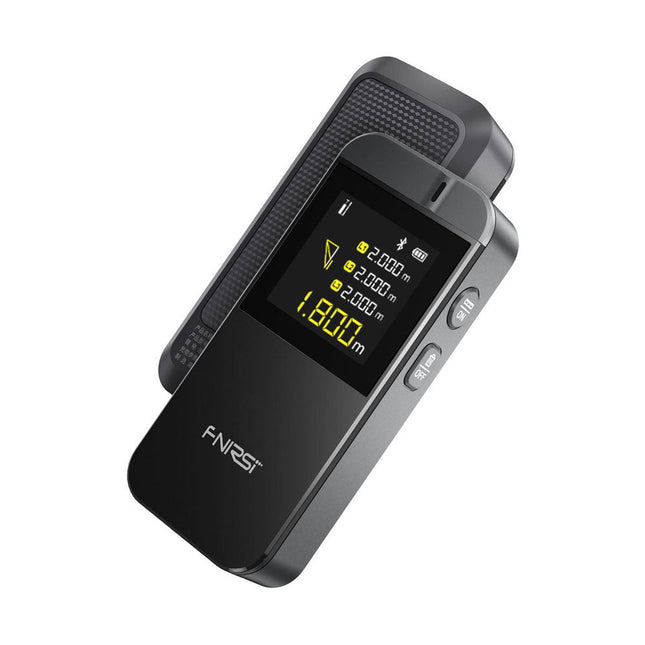
FNIRSI FNIRSI IR40 laser afstandsmeter (40 m)
De FNIRSI IR40 is een compacte, zeer nauwkeurige en snelle afstandsmeter met Bluetooth-integratie, oplaadbare accu, USB-C oplaadpoort, en koppeling met een app. Kenmerken Heeft een hoge precisie van ±2 mm, een meetbereik tot 40 m, en ligt met zijn 8 cm prettig in de hand. Door een intelligent algoritme zal hij de afstandsmeting in een oogwenk uitvoeren. Heeft een verscheidenheid aan functies, waaronder enkelvoudige meting, meervoudige metingen, oppervlaktemeting, volumemeting, Pythagoras, tweede Pythagoras, voor en achterkant verwijzing, en eenheidsomschakeling. FNIRSI IR40 laser afstandsmeter is uitgerust met een ROHM versnellingssensor die auto flip mogelijk maakt. Ingebouwde 400 mAh accu kan snel worden opgeladen via een USB-C oplaadpoort. Wanneer hij volledig is opgeladen kan de meter tot 3000 keer continu meten. Hij ondersteunt Android, iOS systemen en Link APP om diverse functies te ondersteunen, zoals data synchronisatie/opmerkingen, lengte/oppervlakte/volumeberekening, plattegrondtekening, real-time opname, enz. Specificaties Meetbereik 0,05 ~ 40 m Meetnauwkeurigheid ±2 mm Lasertype 620 - 670 nm Meettijd 0,1 ~ 3s Resolutie 1 mm Eenheden m/ft/in Afmetingen 79 x 34,5 x 19 mm Inbegrepen FNIRSI IR40 afstandsmeter USB kabel Handleiding Downloads Manual Android-app iOS-app
-
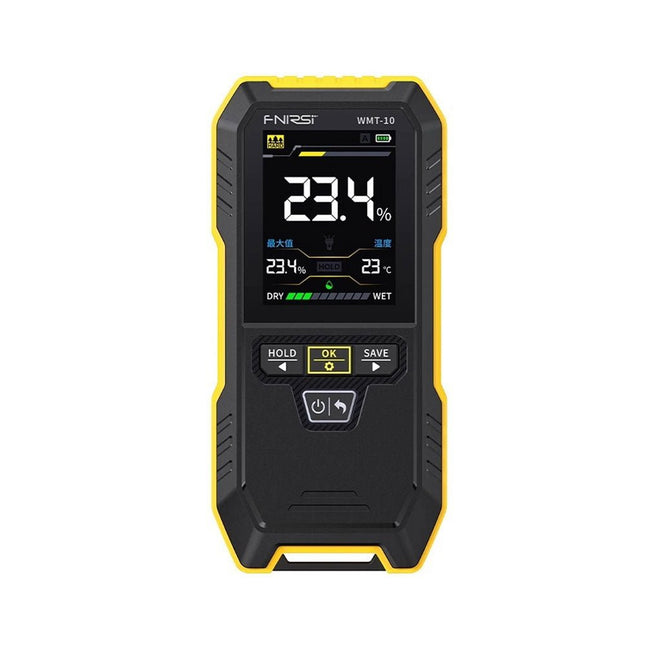
FNIRSI FNIRSI WMT-10 Inductieve houtvochtigheidsmeter
De WMT-10 Inductieve Houtvochtmeter beschikt over een 2,4-inch HD-kleurenscherm, speciaal ontworpen om tegemoet te komen aan de behoeften van de houtverwerkende industrie en houtgebruikers. Dit geavanceerde apparaat biedt nauwkeurige metingen van het houtvochtgehalte en ondersteunt vier veelzijdige meetmodi: hardhout, zachthout, gipsmuur en bakstenen muur. Specificaties Meettype Niet-destructief / pinloos / inductief / contactloos testen Weergave 2,4" TFT-kleurenscherm Resolutie 0,1% Diepte meten (max) 17 mm Sensorgrootte 40,5 x 40,5 mm Meetbereik Gipsmuur: 0~25% Bakstenen muur: 0~43% Zachthout: 0~75% Hardhout: 0~75% Meetfout ±1,5% Vochtigheidsalarm Geluidsalarm / Kleuralarm Automatische uitschakeling 5/10/15 minuten Gegevens opslaan en bekijken Bewaar en bekijk maximaal 30 gegevenssets Voeding 1000 mAh lithiumbatterij Bedrijfstemperatuur 0~40℃ Afmetingen 206 x 99 x 44 mm Gewicht 238 g Inbegrepen 1x FNIRSI WMT-10 houtvochtmeter 1x USB-kabel 1x Manual Downloads Manual
-
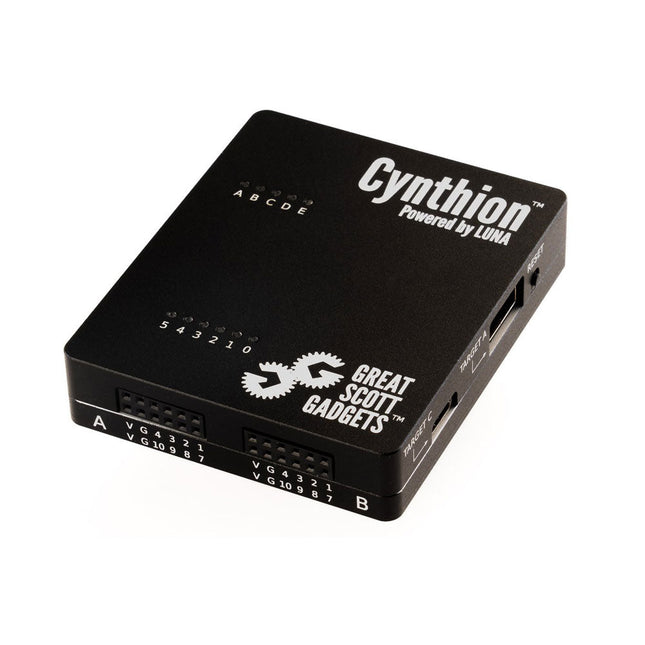
Great Scott Gadgets Great Scott Gadgets Cynthion USB Analyzer
Multitool voor het bouwen, analyseren en hacken van USB-apparaten Cynthion is een alles-in-één tool voor het bouwen, testen, monitoren en experimenteren met USB-apparaten. Gebouwd rond een unieke FPGA-gebaseerde architectuur, kan de digitale hardware van Cynthion volledig worden aangepast aan de betreffende toepassing. Als gevolg hiervan kan het fungeren als een compromisloze snelle USB-protocol-analyzer, een USB-multitool voor onderzoek of een USB-ontwikkelplatform. Out-of-the-box fungeert Cynthion als een USB-protocol-analyzer die verkeer tussen een host en elk Low-, Full- of High-Speed ("USB 2.0") USB-apparaat kan vastleggen en analyseren. Het werkt naadloos samen met de open-source analysesoftware Packetry. Gecombineerd met de LUNA-gateware en Facedancer-bibliotheken wordt Cynthion een veelzijdige USB-onderzoeks- en ontwikkelingstool. Facedancer maakt het snel en gemakkelijk om echte USB-apparaten te maken of ermee te experimenteren (niet alleen emulaties), zelfs als je geen ervaring hebt met digitaal hardwareontwerp, HDL of FPGA-architectuur! Kenmerken Cynthion is een volledig herconfigureerbaar testinstrument dat alle hardware, gateware, firmware en software biedt waarmee u kunt werken, en zelfs de master-USB kunt gebruiken. Hieronder vindt u enkele uitdagingen waarvoor u uw Cynthion kunt toepassen: Protocolanalyse voor Low-, Full- en High-speed USB: Cynthion biedt alles wat u nodig heeft voor passieve USB-monitoring. Met de Packetry USB-analysesoftware biedt Cynthion alles wat u nodig heeft voor passieve USB-monitoring. Je eigen Low-, Full- of High-speed USB-apparaat maken: LUNA biedt Amaranth-gateware waarmee je USB-apparaten kunt maken in gateware, firmware of een combinatie van beide. Met behulp van de Facedancer-bibliotheek kunt u echte USB-apparaten maken of emuleren in Python op hoog niveau. Meddler-in-the-Middle (MitM) aanvallen op USB-communicatie: Cynthion-hardware kan functioneren als een "USB-proxy" die in staat is om op transparante wijze USB-gegevens te wijzigen terwijl deze tussen een host en een apparaat stromen. De drie USB-C-verbindingen van elk bord maken gelijktijdige, snelle proxying mogelijk, terwijl een snelle verbinding met de host behouden blijft. Hierdoor kunt u een verbinding proxy maken, met of zonder de hulp van een host-pc. USB reverse engineering en beveiligingsonderzoek: Cynthion-hardware en LUNA-gateware vertegenwoordigen een speciaal gebouwde backend voor onderzoekstools zoals Facedancer en USB-fuzzing-bibliotheken, waardoor de emulatie en snelle prototyping van compatibele en niet-compatibele USB-apparaten worden vereenvoudigd. In tegenstelling tot andere USB-emulatieoplossingen is op Cynthion gebaseerde hardware dynamisch herconfigureerbaar, waardoor u de flexibiliteit krijgt om elke eindpuntconfiguratie te creëren en vrijwel elk USB-(mis)gedrag te vertonen. Specificaties Een Lattice Semiconductor LFE5U-12F ECP5 FPGA ondersteund door de yosys+nextpnr open-source FPGA-stroom Drie snelle USB-interfaces, elk aangesloten op een USB3343 PHY die tot 480 Mbps kan werken. Twee USB-C-connectoren voor communicatie in apparaatmodus (linkerzijde) Eén USB-C-connector voor communicatie in hostmodus, communicatie in apparaatmodus of USB-analyse (rechterkant) Eén USB-A-connector voor communicatie in hostmodus of USB-analyse (rechterkant, gedeeld met USB-C-connector) Een Microchip SAMD11-foutopsporingscontroller maakt gebruikersconfiguratie van de FPGA mogelijk en biedt een aantal diagnostische interfaces. Een complete, door de gebruiker programmeerbare JTAG-controller die de FPGA kan configureren en via JTAG kan communiceren met gebruikersontwerpen Een ingebouwde USB-naar-seriële communicatiebrug voor FPGA-foutopsporing I/O Een verscheidenheid aan eenvoudige, ingebouwde foutopsporingsmechanismen, waaronder hulpprogramma's waarmee u eenvoudige, pc-toegankelijke registerinterfaces kunt maken Met drie USB-aan/uit-schakelaars kunt u de stroom naar en van de USB-connectoren aan de rechterkant regelen, waardoor gecontroleerde stroomcycli van USB-gevoede apparaten die worden geanalyseerd, worden vergemakkelijkt. 64 Mbit (8 MiB) RAM voor het bufferen van USB-verkeer of voor gebruikerstoepassingen Twee Digilent Pmod-compatibele I/O-connectoren die 16 snelle FPGA-gebruikers-IO's presenteren die FPGA-applicaties van gebruikers ondersteunen 32 Mbit (4 MiB) SPI-aangesloten flitser voor FPGA-configuratie zonder pc Zes op FPGA aangesloten gebruikers-LED's en vijf door een microcontroller beheerde status-LED's Een PAC1954 4-kanaals I²C-vermogensmonitor-IC, om VBUS-spanningen en -stromen op alle vier de Cynthion USB-poorten te meten. Twee FUSB302B I²C USB-C-poortcontrollers, voor de AUX- en TARGET-C-poorten, ter ondersteuning van USB Power Delivery of aangepast USB-C-gedrag. Downloads Documentation Hardware Design Files Schematic, Diagrams & Software
-
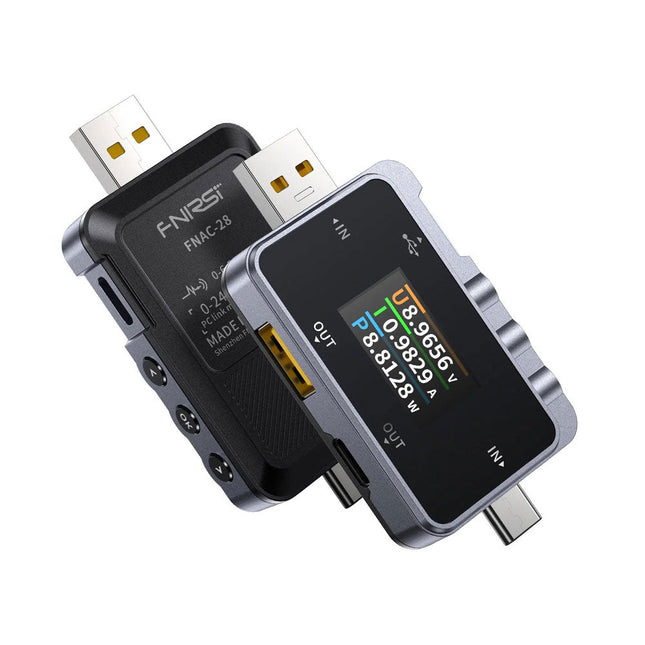
FNIRSI FNIRSI FNAC-28 USB-tester
De FNIRSI FNAC-28 is een veelzijdige USB-tester die functioneert als een spannings-/stroommeter en snellaadtrigger. Ondersteunt tot 6,5 A bidirectionele stroomdetectie via USB-A en USB-C en beschikt over een uiterst nauwkeurige 16-bits ADC voor nauwkeurige metingen. Met multifunctionele gegevensanalyse, ondersteuning voor snellaadprotocollen (QC, VOOC, WARP, enz.) en kabelweerstanddetectie is het ideaal voor gedetailleerde stroom- en laaddiagnostiek. Kenmerken Bidirectionele hoge stroomdetectie: Ondersteunt tot 6,5 A bidirectionele stroomdetectie. Compatibel met USB-A- en USB-C-interfaces, meet nauwkeurig zowel de stroomtoevoer als het stroomverbruik, waardoor gebruikers gedetailleerde gegevensondersteuning krijgen. Hoge precisie meetchip: Uitgerust met een externe 16-bits ADC, zorgt de USB-vermogensmeter voor nauwkeurige spannings- en stroommetingen, waardoor fouten effectief worden geminimaliseerd en de testnauwkeurigheid wordt verbeterd. Multifunctionele gegevensanalyse: Ondersteunt batterijcapaciteitstesten en slaat tot 5 datasets op. Het beschikt ook over curveweergave, golfvormpauze en een instelbare tijdbasis voor gedetailleerde gegevensobservatie. Ondersteuning van snellaadprotocol: Ondersteunt QC2.0/QC3.0, FCP/SCP, AFC, VOOC/WARP en SVOOC 1.0/2.0-triggering. Alle ondersteunde protocollen worden automatisch gedetecteerd om te voldoen aan een breed scala aan testbehoeften. Kabeldetectie en -simulatie: Met behulp van de differentiële drukmethode meet de USB-detector de interne kabelweerstand, simuleert APPLE 2.4 A en DASH snelladen en leest DASH-kabelinformatie. Specificaties Resolutie Nauwkeurigheid Display 1,06" full-color TFT LCD-scherm Gecontroleerde spanning 4~24 V 0,001 V ±(0,2‰+2) Gecontroleerde stroom 0~6,5 A 0,001 A ±(0,2‰+2) Gecontroleerd vermogen 0~156 W 0,001 W ±(0,2‰+2) Protocoldetectie QC2.0: 5 V/9 V/12 V/20 V QC3.0: 3.4-20 V FCP: 9 V/12 V/20 V SCP: 5.5-6.0 V AFC: 9 V/12 V VOOC/WARP: 20 V SVOOC 1.0: Ja SVOOC 2.0: Ja Temperatuurweergave °C/°F-schakelaar Talen Engels en Chinees Kabelweerstand Ja DASH-kabel detecteren Ja Zachte DASH-kabel Ja Zachte APPLE 2.4A Ja Helderheid Aanpassing Ja Standby-tijd instellen Ja Firmware-upgrade Ja Afmetingen 73 x 36 x 12 mm Gewicht 21 g Inbegrepen 1x FNIRSI FNAC-28 USB-tester 1x USB-kabel 1x Manual Downloads Manual FNIRSI USB Meter for PC (Windows/Linux) FNIRSI Bluetooth App (Android) Manual_USB Meter PC Software Manual_Android Bluetooth App























